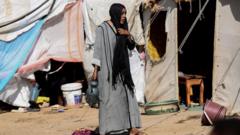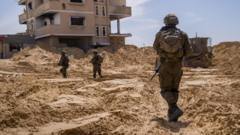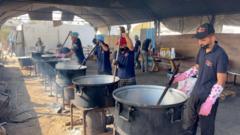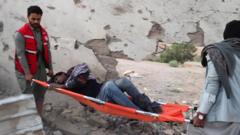The Rapid Support Forces have launched their first drone strikes in Port Sudan, targeting military and civilian sites, marking a significant escalation in Sudan’s ongoing civil war, which has already displaced millions and claimed hundreds of thousands of lives.**
Drones in Port Sudan: A New Front in Sudan's Civil War**

Drones in Port Sudan: A New Front in Sudan's Civil War**
Paramilitary RSF's drone attack signals escalating violence in the two-year civil conflict.**
In a startling development that highlights the escalating violence in Sudan's brutal civil war, the Rapid Support Forces (RSF) launched a drone attack on a military airport in Port Sudan on Sunday. This marks the first time the paramilitary group has reached this eastern Red Sea port city, which serves as the de facto capital for Sudan’s military-led government, since the conflict erupted two years ago.
According to Sudanese army spokesperson Nabil Abdullah, the RSF utilized multiple "suicide drones" to target Osman Digna Air Base, alongside civilian facilities and a goods warehouse. Although the army reported no injuries from the strike, it did confirm some “limited damage.” The RSF has yet to provide any commentary on the aggressive action.
The civil conflict ignited in April 2023 due to a power struggle between the Sudanese Armed Forces (SAF) and the RSF, coinciding with a planned transition to civilian governance. The ongoing war has resulted in an estimated 150,000 deaths and forced about 12 million people to flee their homes. The United Nations has labeled the situation in Sudan as the world's largest humanitarian crisis, with over 30 million individuals requiring aid and facing dire food shortages.
Port Sudan had previously managed to avoid violence and was viewed as a refuge for displaced civilians escaping the turmoil. After losing control of Khartoum early in the war, the military-led government established its headquarters in Port Sudan, leading international agencies to relocate their offices to the coastal city.
Eyewitness accounts reported chaos at the airport during the strikes, with several travelers being rapidly evacuated. Social media footage appears to show explosions and significant smoke rising from the site. Following the drone attacks, the airport has been shut down, leading to the suspension of all flights.
The conflict has carved Sudan into rival zones, with the RSF, commanded by General Mohamed Hamdan Dagalo, better known as Hemedti, controlling extensive territories in Darfur and portions of the south, while the army maintains control over the eastern and northern regions, including Port Sudan.
This drone strike adds to an ongoing series of RSF drone attacks on military and civilian targets in regions held by the army, including a reported attack on Kassala, further exemplifying how deeply entrenched the conflict has become. Although the SAF has regained significant ground in recent months—including the presidential palace in Khartoum—analyses suggest a stable government remains out of reach for either faction.
As Sudan faces its third civil war in seven decades, this conflict is seen as the most severe, exacerbating national divisions and drawing in foreign interest as international efforts to negotiate peace continue to falter. After the coup in 2021, a military council led by General Abdel Fattah al-Burhan and his deputy Hemedti has struggled against growing tensions, particularly regarding the transition to a civilian administration and the future status of the RSF.
With both factions receiving international backing, the situation is precarious, as the possibility of peace seems increasingly elusive.
According to Sudanese army spokesperson Nabil Abdullah, the RSF utilized multiple "suicide drones" to target Osman Digna Air Base, alongside civilian facilities and a goods warehouse. Although the army reported no injuries from the strike, it did confirm some “limited damage.” The RSF has yet to provide any commentary on the aggressive action.
The civil conflict ignited in April 2023 due to a power struggle between the Sudanese Armed Forces (SAF) and the RSF, coinciding with a planned transition to civilian governance. The ongoing war has resulted in an estimated 150,000 deaths and forced about 12 million people to flee their homes. The United Nations has labeled the situation in Sudan as the world's largest humanitarian crisis, with over 30 million individuals requiring aid and facing dire food shortages.
Port Sudan had previously managed to avoid violence and was viewed as a refuge for displaced civilians escaping the turmoil. After losing control of Khartoum early in the war, the military-led government established its headquarters in Port Sudan, leading international agencies to relocate their offices to the coastal city.
Eyewitness accounts reported chaos at the airport during the strikes, with several travelers being rapidly evacuated. Social media footage appears to show explosions and significant smoke rising from the site. Following the drone attacks, the airport has been shut down, leading to the suspension of all flights.
The conflict has carved Sudan into rival zones, with the RSF, commanded by General Mohamed Hamdan Dagalo, better known as Hemedti, controlling extensive territories in Darfur and portions of the south, while the army maintains control over the eastern and northern regions, including Port Sudan.
This drone strike adds to an ongoing series of RSF drone attacks on military and civilian targets in regions held by the army, including a reported attack on Kassala, further exemplifying how deeply entrenched the conflict has become. Although the SAF has regained significant ground in recent months—including the presidential palace in Khartoum—analyses suggest a stable government remains out of reach for either faction.
As Sudan faces its third civil war in seven decades, this conflict is seen as the most severe, exacerbating national divisions and drawing in foreign interest as international efforts to negotiate peace continue to falter. After the coup in 2021, a military council led by General Abdel Fattah al-Burhan and his deputy Hemedti has struggled against growing tensions, particularly regarding the transition to a civilian administration and the future status of the RSF.
With both factions receiving international backing, the situation is precarious, as the possibility of peace seems increasingly elusive.





















